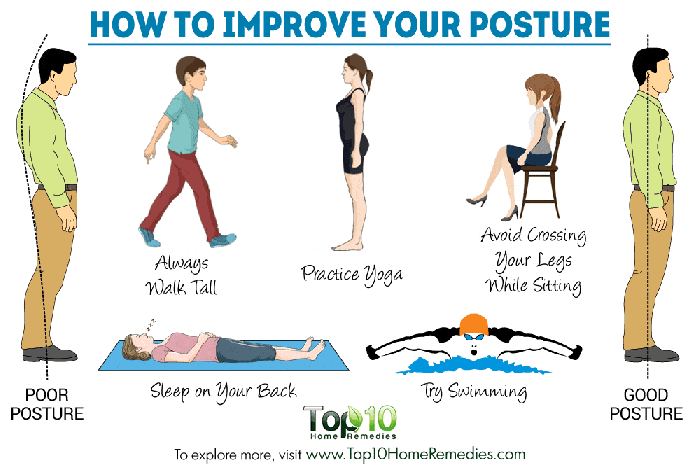Exploring the realm of improving your posture with 5 beneficial exercises for a healthy back, this introduction aims to captivate readers with insightful information and practical tips.
Detailing the significance of maintaining good posture and the impact it has on overall health, this introductory paragraph sets the stage for a comprehensive discussion on enhancing posture through targeted exercises.
Importance of Good Posture

Maintaining good posture is crucial for overall health as it plays a significant role in preventing various health issues and ensuring the proper alignment of the body. Poor posture can lead to back pain, muscle strain, headaches, and even affect digestion and breathing. It can also impact mood, energy levels, and overall quality of life.
Examples of Health Issues Caused by Poor Posture
- Back Pain: Slouching or hunching can put excess pressure on the spine, leading to chronic back pain.
- Neck Pain: Forward head posture from looking down at screens can strain the neck muscles and cause discomfort.
- Digestive Problems: Poor posture can compress organs in the abdomen, affecting digestion and causing issues like acid reflux.
Benefits of Improving Posture
- Reduced Pain: By correcting posture, individuals can alleviate back, neck, and shoulder pain caused by poor alignment.
- Improved Breathing: Proper posture allows for better lung expansion, leading to improved oxygen intake and overall respiratory function.
- Enhanced Confidence: Good posture can make individuals appear taller, more confident, and assertive in various social and professional settings.
Five Exercises for Better Posture

Regularly practicing exercises can help strengthen the muscles that support your spine, leading to improved posture. Here are five effective exercises to incorporate into your routine:
1. Planks
Planks are a great exercise for strengthening the core muscles, which play a crucial role in maintaining good posture. To perform a plank:
– Start in a push-up position with your hands directly under your shoulders.
– Engage your core muscles and hold your body in a straight line from head to heels.
– Hold the position for 30-60 seconds, gradually increasing as you build strength.
2. Shoulder Blade Squeezes
This exercise targets the muscles between your shoulder blades, which help stabilize and support your upper back. To do shoulder blade squeezes:
– Sit or stand up straight with your arms by your sides.
– Squeeze your shoulder blades together as if you are trying to hold a pencil between them.
– Hold for 5-10 seconds, then release. Repeat for 10-15 repetitions.
3. Cat-Cow Stretch
The cat-cow stretch helps improve flexibility in the spine and stretches the muscles along the back. To perform this stretch:
– Start on your hands and knees with a neutral spine.
– Inhale as you arch your back, dropping your belly and lifting your head (cow position).
– Exhale as you round your spine, tucking your chin to your chest (cat position).
– Repeat this movement for 10-15 reps.
4. Hip Flexor Stretch
Tight hip flexors can contribute to poor posture by pulling the pelvis forward. To stretch the hip flexors:
– Kneel on one knee with the other foot planted in front, forming a 90-degree angle.
– Shift your weight forward until you feel a stretch in the front of your hip.
– Hold for 30 seconds on each side, repeating 2-3 times.
5. Wall Angels
Wall angels target the muscles in the upper back and shoulders to improve posture. To do wall angels:
– Stand with your back against a wall, feet hip-width apart.
– Raise your arms to shoulder height with elbows bent at 90 degrees, then slide them up and down the wall in a snow angel motion.
– Keep your core engaged and back flat against the wall throughout the movement.
Tips for Incorporating Exercises into Daily Routine

To truly benefit from posture-improving exercises, it is essential to make them a consistent part of your daily routine. Here are some strategies to help you incorporate these exercises seamlessly into your day-to-day life:
Set a Schedule and Stick to It
Creating a specific time slot for your exercises each day can help ensure that you prioritize them. Whether it’s in the morning before work, during your lunch break, or in the evening before dinner, find a time that works best for you and commit to it.
Start Slow and Progress Gradually
It’s important to start slowly with these exercises, especially if you are new to them. Gradually increase the intensity or duration as your strength and flexibility improve. This approach will help prevent injury and ensure that you continue to see progress over time.
Track Your Progress and Stay Motivated
Keeping a journal or using a fitness app to track your exercises and monitor your progress can be incredibly motivating. Celebrate small victories along the way and use any setbacks as opportunities to learn and grow. Remember, consistency is key when it comes to improving your posture and overall health. Stay committed and the results will follow.
End of Discussion

Concluding our exploration of posture improvement techniques, this summary encapsulates the key takeaways from the discussion, emphasizing the importance of consistency and motivation in achieving a healthier back.